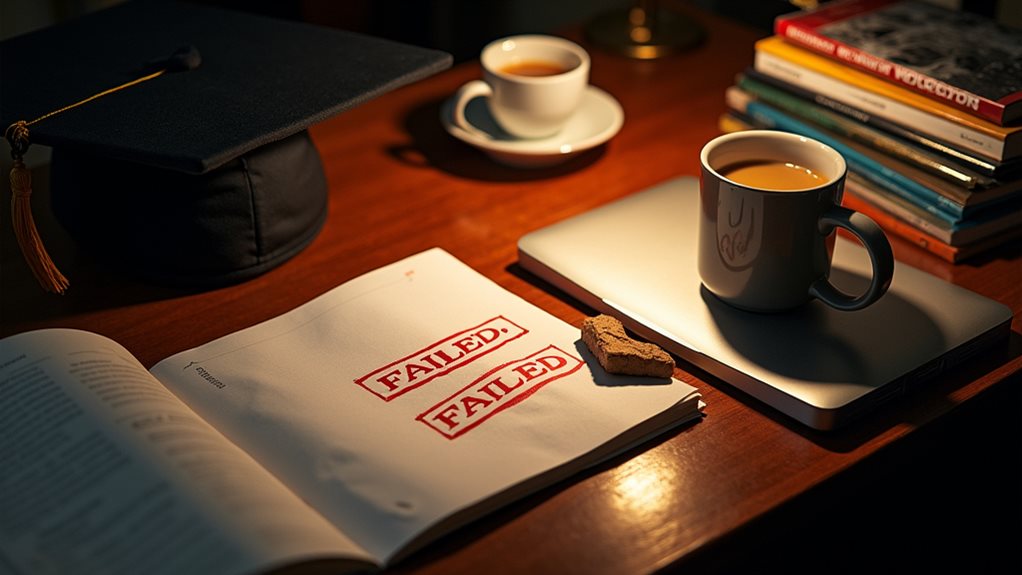If you fail the SQE three times, you’ll face a six-year ban from retaking any component of the exam, and your previous passes will become invalid under the SRA’s “three strikes rule.” While this setback considerably impacts your path to becoming a solicitor, you’ve got alternative career options in legal operations, compliance, or legal technology consulting. Understanding your professional development options and alternative legal roles can help you chart a successful course forward.
Understanding the SQE Three-Attempt Limit and Its Implications

While pursuing your legal career through the Solicitors Qualifying Examination (SQE), you’ll need to be aware of the strict three-attempt limit that applies to each assessment. This policy’s SQE implications mean you must approach your exam preparation with careful strategy and thorough planning. You can’t afford to take these attempts lightly, as reaching this limit could greatly impact your path to becoming a solicitor.
Before each attempt, you’ll want to honestly assess your readiness and verify you’ve addressed any knowledge gaps from previous failures. Consider working with tutors who specialize in SQE preparation, and don’t hesitate to postpone an attempt if you’re not fully prepared. Additionally, keep in mind the three strikes rule, as failing any component three times not only bars you from retaking the exam for six years but also invalidates all previously earned passes.
Alternative Career Paths in Law After Exhausting SQE Attempts
Although reaching the SQE attempt limit can feel devastating, you’ll find numerous alternative paths to build a rewarding legal career. Your legal knowledge and training can open doors to various alternative legal careers that don’t require solicitor qualification.
Consider roles like legal operations manager, compliance officer, or legal technology consultant, where your understanding of law remains valuable. Additionally, exploring careers in legal technology can provide dynamic opportunities that leverage your legal expertise in innovative ways.
Legal expertise opens doors beyond traditional practice – from operations management to compliance and legal tech consulting roles.
Your transferable skills from SQE preparation, including analytical thinking, research abilities, and legal writing, make you an attractive candidate for positions in regulatory affairs, contract management, and legal publishing.
You might also explore opportunities as a paralegal, legal recruiter, or risk management specialist. Many professionals find these alternative paths equally fulfilling, often discovering that their unique journey has equipped them with distinctive perspectives that employers value.
Strategic Options for Professional Development Beyond the SQE
Building your professional development strategy beyond the SQE opens up exciting opportunities for growth and advancement in the legal sector.
You’ll find numerous paths to enhance your expertise through specialized legal certifications, paralegal qualifications, or focused training in emerging areas like legal technology and compliance.
Consider investing in skills enhancement programs that target your areas of interest, whether that’s commercial law, intellectual property, or regulatory affairs.
You can pursue professional certifications that complement your existing knowledge while building valuable networking opportunities through industry associations and legal forums.
Don’t overlook alternative roles within the legal sector, such as legal operations management or compliance consulting, where your understanding of law combines with business acumen.
These positions often offer competitive compensation and clear advancement paths without requiring SQE qualification. Additionally, you might explore gaining valuable Qualifying Work Experience that can further bolster your credentials while developing essential competencies in the legal field.
Frequently Asked Questions
Can I Appeal a Failed SQE Attempt Due to Exceptional Circumstances?
Yes, you can submit an appeal for exceptional circumstances through SRA’s formal appeal process. You’ll need to provide evidence supporting your case, like medical documentation or other significant events affecting your performance.
How Long Must I Wait Between SQE Attempts?
Like a trusty time machine, you’ll need to wait at least 3 months between SQE attempts. Use this period wisely to develop retake strategies and gather fresh study resources for your next shot.
Do Failed SQE Attempts Appear on My Professional Record Permanently?
Your failed attempts at the SQE won’t appear on your permanent professional record. The SRA only maintains internal records of exam results, which aren’t publicly disclosed or shared with potential employers.
Can I Transfer My SQE Exam Fees to Another Qualification?
You can’t transfer your SQE exam fees to other qualifications. The fees you’ve paid are specific to the SQE assessment, and there aren’t any transfer options available between different professional qualification programs.
Are There Any Age Restrictions for Retaking the SQE?
There aren’t any age requirements or upper age limits for retaking the SQE. You’re eligible to retake the exam regardless of your age, as long as you meet the standard qualification and registration requirements.
Final Thoughts
While failing the SQE three times might feel like the end of your legal journey, it’s ironically just the beginning of discovering your true path. You’ve gained valuable insights that many practicing solicitors haven’t experienced, positioning you uniquely for alternative legal careers. Whether you pivot to legal technology, compliance, or consultancy, you’re equipped with a deep understanding of the law that’ll serve you well beyond traditional practice.


